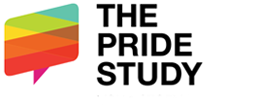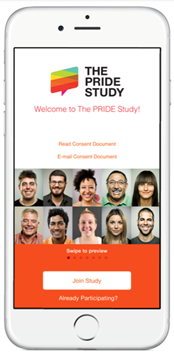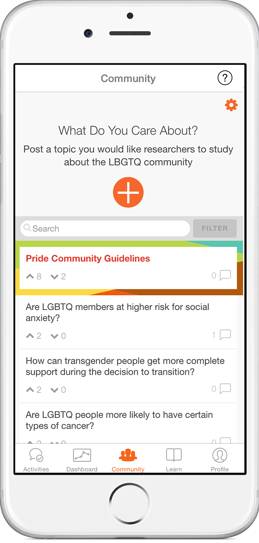
Note: CTSI provided technology and recruitment advice/consultation to the PRIDE study. Additionally, PCORI (Patient-Centered Outcomes Research Institute) recently announced that it will fund PRIDEnet as a new PPRN (Patient Powered Research Networks) in Phase II of PCORnet.
The first nationwide, longitudinal study of lesbian, gay, bisexual, transgender, queer (LGBTQ) and other sexual gender minorities launched today with release of the PRIDE (Population Research in Identity and Disparities for Equality) Study iPhone mobile app. The PRIDE Study aims to develop a better understanding of factors that influence the health of LGBTQ people and improve health disparities within these communities.
Led by UCSF researchers Juno Obedin-Maliver, MD, MPH and Mitchell R. Lunn, MD, The PRIDE Study will follow participants for decades through annual health questionnaires distributed via web and mobile channels. Those interested in joining the study can text PRIDESTUDY to 74121 to get started.
Evolving Clinical Research Methodology
The PRIDE Study is noteworthy not only because it focuses on the LGBTQ community, a population that is underrepresented and understudied in the healthcare system, but for its utilization of technology to design, conduct and report on research.
Obedin-Maliver and Lunn have incorporated a number of technologies into The PRIDE Study’s design, with the goal of making research more efficient, robust and participant-friendly. These include an Apple ResearchKit-enabled iPhone mobile app, developed by digital agency THREAD Research, and a web-based participant management portal, currently in development by the Salesforce Foundation.
 Researchers are increasingly looking to web and mobile technologies to solve challenges commonly encountered while conducting clinical research. For example, large cohort studies like The PRIDE Study often find it difficult to recruit significant volumes of new participants while retaining existing participants. Mobile apps and web portals deployed strategically help researchers overcome these obstacles by reaching more potential participants, facilitating enrollment, reducing the burden of participation and fostering on-going engagement with study populations.
Researchers are increasingly looking to web and mobile technologies to solve challenges commonly encountered while conducting clinical research. For example, large cohort studies like The PRIDE Study often find it difficult to recruit significant volumes of new participants while retaining existing participants. Mobile apps and web portals deployed strategically help researchers overcome these obstacles by reaching more potential participants, facilitating enrollment, reducing the burden of participation and fostering on-going engagement with study populations.
Other UCSF research studies, including Health eHeart, Brain Health Registry and BRAiN-M, have deployed various web and mobile technologies to address similar issues.
Democratizing the Research Process
The mobile app launched today officially kicks off phase one of The PRIDE Study and is an important tool with which Obedin-Maliver and Lunn will listen to study participants. In addition to facilitating enrollment and consent, the app will be used to crowdsource research questions directly from the LGBTQ community.
The PRIDE Study Mobile App - Key Features
- Participant screening
- Consent & enrollment
- Community feedback
- Questionnaire delivery
- Activity tracking
- Alerts & notifications
- Real-time cohort demographics
“We want to involve the LGBTQ community in the research process from end-to-end,” said Lunn. “It’s important to Juno and me that PRIDE address research questions that are relevant and top-of-mind within the community, and the app will help us accomplish this.”
Built using the ResearchKit framework developed by Apple, the app will subsequently be used to field test questions considered for the annual health questionnaire and enable Obedin-Maliver and Lunn to collect participants’ physical activity, as detected through native iPhone sensors and linked devices. The PRIDE Study iPhone mobile app is the first ResearchKit-enabled app designed to study a population as opposed to a specific disease.
 Engaging on Multiple Fronts
Engaging on Multiple Fronts
Both The PRIDE Study mobile app and web portal will provide multiple opportunities to engage participants on an on-going basis. Participants can opt-in to receive text, email or voice notifications about new study questionnaires and will have the ability to participate in discussions with other participants. Study results and other important LGBTQ-related health information will also be shared through the app and web platforms. A future enhancement to The PRIDE Study mobile app will leverage geofencing to detect when a participant is in the hospital, creating opportunities for deeper engagement in specific situations.
The PRIDE Study has also established a participant-powered research network committed to LGBTQ health, which will play an important role in engaging the community. Dubbed PRIDEnet, it includes over 40 LGBTQ-focused community-based organizations, health clinics and national professional organizations.
“PRIDEnet is a key component of how we plan to engage with study participants and the wider LGBTQ community over the long-term. These partners understand the importance of The PRIDE Study and are committed to helping us with recruitment, community listening and dissemination of results,” says Obedin-Maliver. “The strength of this network and the tools we have in place to listen to and interact with participants will be invaluable as we engage this population over the coming decades.”
Read more about the genesis of The PRIDE Study in this story from ucsf.edu.
